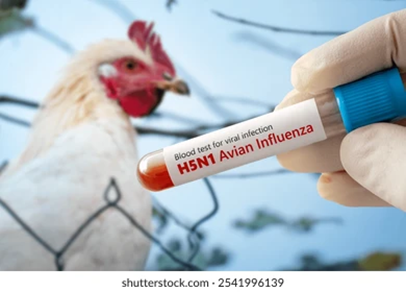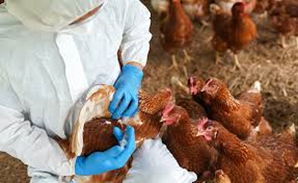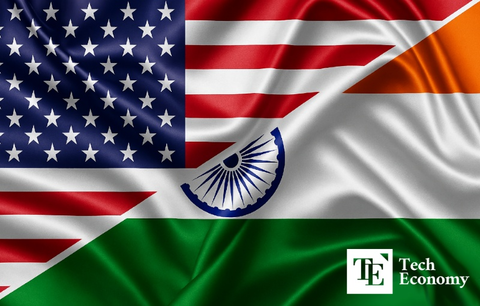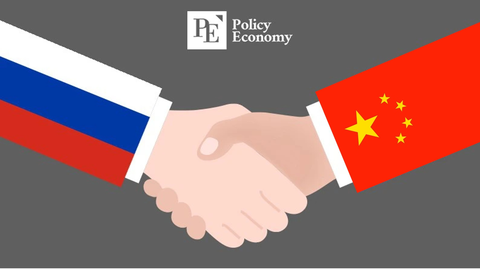Zoetis Receives Conditional Approval for Bird Flu Vaccine from US Department of Agriculture: A Milestone in Avian Flu Protection
Input
Changed
In a significant development, Zoetis, a global animal health company, has received conditional approval from the United States Department of Agriculture (USDA) for its bird flu vaccine aimed at protecting poultry from the deadly avian influenza virus (H5N1). This approval marks a critical milestone in the global effort to curb the impact of bird flu outbreaks, which have caused widespread economic and ecological damage in recent years. However, the approval also underscores the growing complexities surrounding public health, trade, and politics, particularly in the context of vaccine distribution and competition.

Zoetis’ vaccine promises to offer a new line of defense against avian influenza, a virus that has plagued the poultry industry worldwide for decades. H5N1, the strain responsible for the latest wave of outbreaks, has proven to be highly contagious and lethal to birds, leading to mass culling of infected flocks. The approval of Zoetis’ vaccine brings hope to the poultry industry, offering a potential solution to mitigate the impact of these outbreaks. Yet, as with many other breakthroughs in the health sector, the development and approval process for this vaccine have not been without controversy.
A Breakthrough Vaccine: Conditional Approval by the USDA
On February 14, 2025, Zoetis announced that it had received conditional approval from the USDA for its bird flu vaccine, a major achievement for the company and a pivotal moment in the fight against avian influenza. The vaccine is designed to prevent the spread of H5N1 among poultry populations, thereby protecting the industry from devastating outbreaks that result in the loss of millions of birds and significant financial damage.

The USDA’s approval is conditional, meaning that the vaccine can be distributed and used, but Zoetis must continue to conduct ongoing studies to further assess the vaccine's long-term safety and effectiveness. This is a standard procedure for many vaccines, especially those aimed at animal populations. Conditional approval allows for a more rapid response to urgent health threats, such as the spread of H5N1, which has the potential to cause major disruptions in global poultry production.
The conditional approval is a testament to Zoetis’ scientific and regulatory efforts in developing the vaccine. In partnership with government and industry stakeholders, Zoetis has worked for years to develop a product that could help mitigate the impact of avian influenza outbreaks. The company’s success represents a significant advancement in veterinary medicine, as avian influenza remains one of the most challenging diseases to manage in poultry farming.
However, the approval has also sparked a debate about the broader implications of the vaccine’s distribution and use. While the vaccine is a much-needed tool in controlling the spread of H5N1, its approval is not without its complications.
The Politics and Trade Behind the Bird Flu Vaccine
The approval of Zoetis’ bird flu vaccine has not been immune to the political and trade considerations that often shape the healthcare and pharmaceutical industries. As with many major health and agricultural breakthroughs, the distribution of the vaccine is fraught with challenges that go beyond science and medicine. In this case, the politics surrounding vaccine distribution and international trade have played a significant role in shaping the context of Zoetis’ approval.
The United States has long been a major player in global agricultural production, and any vaccine that promises to protect poultry is of immense interest to both domestic and international markets. However, the approval process has faced scrutiny from various stakeholders, particularly in light of the broader global dynamics of trade and political relations. Some critics have raised concerns about whether the approval process has been influenced by national interests, including the “America First” stance taken by the current administration under President Donald Trump.
The Trump administration’s focus on prioritizing American industries and securing economic advantages for the U.S. has influenced many decisions related to agriculture and pharmaceuticals. In the case of the bird flu vaccine, this protectionist approach may have played a role in the decision to approve the vaccine for U.S. markets. Critics argue that this could lead to challenges in vaccine access for other countries, particularly those that rely on imports for their poultry industry.
In addition, the growing competition in the global race to develop an effective H5N1 vaccine has added another layer of complexity to the approval process. Zoetis is not the only company working to develop a bird flu vaccine, and the partial success of Zoetis in securing conditional approval may push other companies to accelerate their own vaccine development efforts. This competition could lead to a situation where multiple vaccines are available but not all may be accessible in certain markets due to political and economic factors.
Furthermore, international relations play a key role in the distribution of such a vaccine. Countries that experience frequent outbreaks of avian influenza may struggle to secure access to vaccines, particularly if the vaccine is primarily focused on domestic markets. For example, while Zoetis' vaccine could potentially be beneficial to poultry farmers in regions outside of the U.S., concerns about trade barriers and unequal access to vaccines could prevent widespread adoption in lower-income countries. This raises questions about the fairness and equity of vaccine distribution on a global scale.

The Rising Competition in the H5N1 Vaccine Market
The approval of Zoetis’ vaccine for bird flu is significant not only because it provides a potential solution to a longstanding problem but also because it highlights the growing competition in the race to develop effective vaccines against H5N1. Zoetis’ success in receiving conditional approval is likely to spur other companies to ramp up their own vaccine development efforts, which could lead to a diverse marketplace for bird flu vaccines in the near future.
The development of an effective bird flu vaccine has been a top priority for many pharmaceutical companies in recent years. As the threat of H5N1 persists and new strains of avian influenza continue to emerge, the need for a reliable vaccine has become more urgent. Zoetis, a leader in animal health products, is now positioned at the forefront of this race, having secured the first conditional approval from the USDA for its H5N1 vaccine.
However, Zoetis’ success is only the beginning of what promises to be a highly competitive field. Other companies, including those that have previously developed vaccines for poultry diseases, are likely to accelerate their own research and development efforts in response to Zoetis’ breakthrough. As Reuters noted, the global market for H5N1 vaccines is set to grow rapidly, with both pharmaceutical companies and governments vying for a share of the market.
One of the key drivers of competition is the potential economic impact of an effective bird flu vaccine. The poultry industry is worth billions of dollars globally, and any vaccine that can help prevent the spread of avian influenza could result in significant cost savings for farmers and producers. At the same time, the vaccine could also play a crucial role in reducing the risk of human transmission of the virus, which could lead to further public health benefits.
This competition is not limited to large companies like Zoetis. Smaller firms, research institutions, and governments are also investing heavily in vaccine development, hoping to create their own solutions to the bird flu crisis. As more companies enter the market, consumers and farmers will benefit from increased options, but the complexities of securing regulatory approvals and navigating trade barriers could present significant challenges.
Zoetis’ Partial Success and the Bigger Picture
Zoetis’ conditional approval represents a major step forward in the development of vaccines to protect poultry from avian influenza. However, the vaccine’s partial success raises several questions about the broader dynamics of vaccine development and approval processes.
First, the issue of vaccine safety and long-term effectiveness remains a crucial factor in determining the overall success of the product. While the conditional approval allows Zoetis to distribute the vaccine in the short term, the company must continue to conduct studies to ensure that the vaccine provides lasting protection against H5N1. This highlights the importance of ongoing scientific research and testing to ensure that vaccines meet the highest safety and efficacy standards.
Moreover, the political implications of vaccine approval and distribution are likely to continue shaping the global landscape for bird flu vaccines. While Zoetis’ vaccine may be a crucial tool in the fight against avian influenza, questions remain about the equitable distribution of such vaccines, particularly in countries that lack the resources to secure them.
Conclusion: A Step Toward Protection, but Not Without Challenges
Zoetis’ conditional approval for its bird flu vaccine is a welcome development in the ongoing battle against avian influenza. However, as with many breakthroughs in public health, the approval process has revealed the complex intersection of science, politics, and trade. While the vaccine offers significant promise in protecting poultry from the devastating effects of H5N1, questions about its distribution and the broader competition for vaccine development persist.
As the poultry industry continues to grapple with the threat of bird flu, Zoetis’ vaccine may serve as a key tool in reducing the impact of future outbreaks. Yet, its partial success is just one chapter in the larger story of global health, trade, and politics that will continue to evolve in the coming years. The world is watching closely to see how this vaccine, and others that may follow, will shape the future of poultry health and public safety.





















